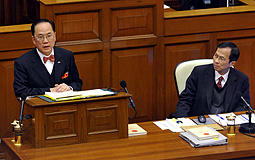
|
| Finance first: Chief Executive Donald Tsang announces his decision to postpone a public consultation on the electoral arrangements for 2012. |
Chief Executive Donald Tsang has decided to defer the public consultation on the electoral arrangements in 2012 until the fourth quarter to focus on tackling economic and livelihood concerns.
Attending a Legislative Council question-and-answer session today, Mr Tsang expressed worries about the economic situation this year, saying the most difficult time may emerge in the first half, with layoffs and business closures after the Lunar New Year. Students who graduate mid-year may be unable to get a job, he added.
To help pull together the Government's and community's efforts to tackle the global financial crisis - and minimise social conflicts - the Government is reviewing the timetable for major policy proposals originally set to be put forward this year, particularly controversial ones.
"The electoral arrangements for 2012 is an important issue which requires an in-depth rational discussion by the public to reach a wide consensus. Now is not an ideal time to conduct a public consultation," Mr Tsang noted.
"I must stress that although the consultation is deferred slightly, we still have sufficient time to have a thorough discussion and reach a consensus on the 2012 electoral arrangements, and to pave way for universal suffrage for the Chief Executive election in 2017 and the Legislative Council election in 2020," he said.
Mr Tsang pledged to deal with the universal-suffrage issue within his tenure, adding Hong Kong will adopt a progressive approach to achieve democracy.
Economic measures
Under the threat of the glocal economic recession, the city will unavoidably face negative growth again. Goods exports may record a double-digit fall in December, while the jobless rate may have risen to 4% or higher in last year's fourth quarter.
Mr Tsang thanked the banking sector for co-operating with the Government in providing loans to firms. More than 30 institutions have joined a special loan guarantee scheme, receiving more than 1,200 applications with almost $2.1 billion approved.
Besides supporting domestic consumption, the Government has also secured the Mainland's assistance for Hong Kong firms there. This includes raising exports' rebate rates and delisting more than 1,700 banned and restricted commodities items.
To boost the economy and create jobs through public investment, Mr Tsang said the Development Bureau will seek LegCo's support for an extra $1 billion allocation on January 20, to boost funding for minor works projects in 2009-10 to $8.6 billion.
Capital works spending to top $29b
Public spending on capital works will exceed $29 billion, creating 10,000 more job opportunities than there were in 2008-09. The Government will also expedite the hiring of civil servants and open up short-term posts, offering more than 11,000 jobs.
Mr Tsang noted Hong Kong will tie in with the national development, enhancing its status as an international financial hub and its strategic position in the Pearl River Delta Region.
He added the Government has been adopting ways to help Lehman Brothers minibond victims, noting 1,515 cases involving $668 million have been settled so far.
|